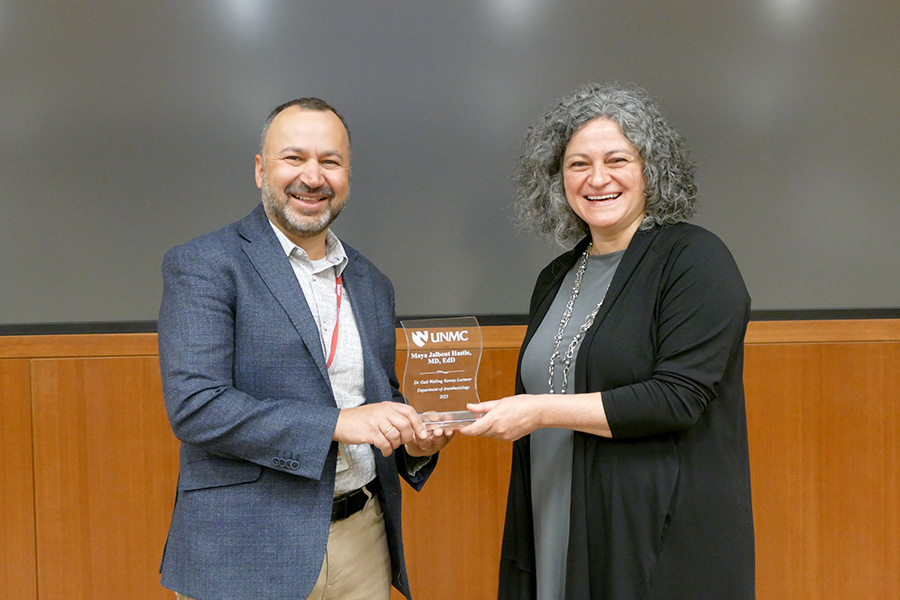The UNMC Department of Anesthesiology hosted Maya Hastie, MD, at the inaugural Dr. Gail Walling Yanney Lectureship on May 17. Dr. Hastie, professor of anesthesiology and cardiac anesthesiologist at Columbia University Irving Medical Center, gave what attendees called an insightful and thought-provoking presentation, titled “Breaking Barriers: Inspiration from Trailblazers.” The presentation drew heavily from her experience, survey data and the success stories of women who have paved a path forward.
Sasha Shillcutt, MD, vice chair of strategy in the anesthesiology department, was awarded the Dr. Gail Walling Yanney Endowed Professorship in Anesthesiology in 2021 and has established the Dr. Gail Yanney Lectureship to honor the legacy of Dr. Walling Yanney.
The focus of the lectureship series is faculty development, particularly developing women as leaders, and diversity, equity and inclusion efforts.
“Dr. Walling Yanney has been an amazing supporter of the department and health care system,” Dr. Shillcutt said. “She was a trailblazer for women in anesthesiology, and this was an excellent delivery of a difficult topic.”
During her presentation, Dr. Hastie led an insightful discussion about gender equity, diversity and the barriers in academic anesthesiology and then concluded with some inspirational ideas on how to move forward.
Dr. Hastie referenced the Associate of American Medical Colleges gender equity charts, which include detailed data on the status of women in academic anesthesiology. According to the report, 37% of faculty and only 23% of professors are women.
“If we look at higher leadership, approximately 15% of our current chairs are women,” Dr. Hastie said. “If we continue at this rate, it’s going to take another 20 years to reach equity.”
Dr. Hastie said some of the barriers that face women on a day-to-day basis include structural and environmental barriers, gender bias or harassment and imposter syndrome. She referenced a National Academies of Science survey that reported two out of three women have experienced a form of sexual harassment at some point in their career.
“The most common form of sexual harassment is gender harassment,” Dr. Hastie said. “What that looks like is verbal and non-verbal behaviors that convey hostility, are derogatory or question people’s abilities.”
Another barrier women face is gender stereotypes, Dr. Hastie said, adding that stereotypes are not inherently bad but are problematic when they are not confluent.
“We have expectations for what a woman should act like, and we have stereotypes for what leaders should act like, and when those clash, we have a problem,” Dr. Hastie said. “What’s the difference between being assertive and being aggressive? It’s your gender.”
Dr. Hastie said these forms of gender biases should not be ignored because policies and practices are built upon them, leading to gender equity issues, including pay gap and disparities in promotion and leadership roles.
In addition to imposter syndrome, Dr. Hastie discussed self-efficacy issues women face, including the “second shift” and non-promotable tasks.
“It is estimated that women spend approximately 200 more hours per year on non-promotable tasks than their male counterparts,” Dr. Hastie said. “Non-promotable tasks are not instrumental to advancing the organization’s mission, don’t require special skills and won’t get you promoted.” The examples she provided included notetaking at meetings, organizing social events and building slides or drafting emails on behalf of a leader.
Dr. Hastie said the “second shift” is the host of domestic responsibilities that most women shoulder in addition to their careers. She said on average, women tend to spend eight to nine hours per week on domestic chores, including household care and childcare.
Dr. Hastie concluded the lecture with the following key ideas from the book “Sisters in Law: How Sandra Day O’Connor and Ruth Bader Ginsburg Went to the Supreme Court and Changed the World,” by Linda Hirshman. The biography details how these trailblazing women influenced modern gender equity in the workplace.
- Remember it’s not you, it’s the system – have confidence in your abilities and know the systematic barriers hindering your success.
- Have friends in high places – Feedback from mentors or sponsors who help build your career is crucial in eliminating a false sense of lack of achievement and inspiring you to continue to advance.
- The grass is greener past the gatekeepers – Have difficult conversations or negotiations with those who influence your career but who doubt your abilities.
- Treat everyone as your equal – Don’t be intimidated by hierarchical roles and engage in conversations and discussions with those above and below you.
- Don’t jump to conclusions – Take the time to diagnose the problem and find a solution.
- Own your failures and don’t make excuses – Don’t blame mistakes on external circumstances.
- Know your triggers, pick your battles – Don’t let emotions control responses and respond strategically, instead of being reactionary.
- Fight the system from within – Be a voice of influence and work towards the change you want to see.
